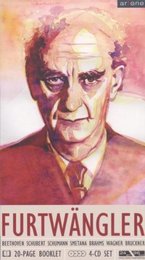| All Artists: Wilhelm Furtwangler Title: Furtwangler Members Wishing: 0 Total Copies: 0 Label: Artone Original Release Date: 1/1/2006 Re-Release Date: 4/27/2006 Album Type: Box set, Import Genre: Classical Style: Number of Discs: 4 SwapaCD Credits: 4 UPC: 4011222223289 |
Search - Wilhelm Furtwangler :: Furtwangler
 | Wilhelm Furtwangler Furtwangler Genre: Classical
|
Larger Image |
CD Details |
CD ReviewsThe Anti-Toscanini Steven A. Peterson | Hershey, PA (Born in Kewanee, IL) | 12/06/2008 (5 out of 5 stars) "Wilhelm Furtwangler is, in a sense, the anti-Toscanini. Arturo Toscanini was an exemplar of that conducting school of thought arguing for playing the music as closely to the composer's vision as possible. Furtwangler was more subjective (or romantic or interpretivist, choose your own word), following the "spirit" of the music. That is not to say that he ignored the composer's music, of course. Perhaps the apotheosis of his work is a recording that I once heard (many years ago). He was conducting the Berlin Philharmonic at a live concern in Berlin toward the end of the war. Much of this symphony was played at an achingly slow pace. Then, toward the end, the tempo became so rapid that it was almost unplayable. Some interpreted that as his effort to speak to Beethoven's concepts of human brotherhood etc. as opposed to Nazism. I'm not going to make a judgment, but it was an example of his approach to music.
This 4 CD set illustrates his musicianship well. The music of Beethoven, Brahms, Schubert, Schumann, Smetana, Wagner, and Bruchner appears. A couple works illustrate. Beethoven's Symphony # 9 (A concert performance recorded at Bayreuth in 1951). A couple facts at the outset. His version takes 74 minutes; Kleiber's takes 66 minutes; Toscanini's NBC Symphony version takes 65. At the other end, I think I recall that Richard Strauss once conducted the Ninth at 45 minutes (I cannot even conceive of that!). And, indeed, the First Movement is played very contemplatively, at a slow pace. The instruments come through cleanly and clearly and the orchestra does play well (Furtwangler was also not so big on heavy duty rehearsal). The Fourth Movement also begins at a slow pace. As the Ode to Joy begins playing out, the pace is lugubrious. By the time the full orchestra takes up the theme, the face has quickened. The finale? It begins at the quick pace and ends at a manic pace (reminding me of my memories of that 1944 or 1945 recording of the Ninth). Across the four movements, the dynamics vary much greater than with many other conductors, although within a tradition of such conductors as Klemperer (at least that's my impression). To me, a nice illustration of what might be called a subjective or interpretivist view of music. "The Moldau." He also conducts the Vienna Philharmonic in Smetana's "Moldau." And I can't resist the statistics: Furtwangler's version lasts 12:39; Kleiber's version takes 10:40 to complete). The orchestral playing is rich, with clarity to the sound. Again, slow tempos prevail throughout much of this work. To conclude, Furtwangler's is not my preferred conducting style. However, I think that he is effective within the terms of his approach. As to the 4 CD set? It is very helpful as a rich, detailed illustration of the art of Wilhelm Furtwangler's conducting. In that, this richly deserves 5 stars. " |

 Track Listings (8) - Disc #1
Track Listings (8) - Disc #1